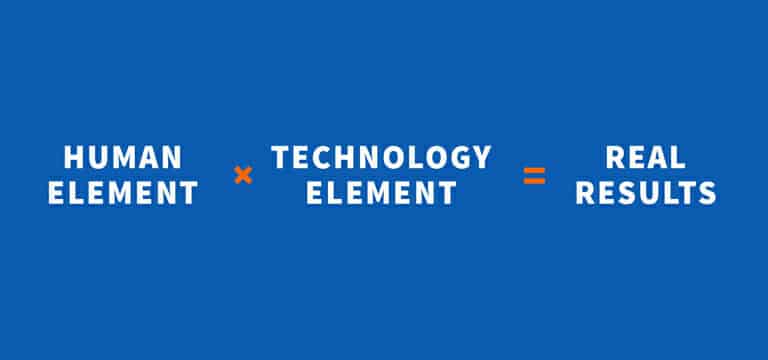In some market segments, competition is so fierce and offerings so similar, that creating a new brand isn’t enough to stand out. If your field is crowded with me-too competitors, and particularly if those competitors are larger than you and have bigger marketing budgets, you don’t win by playing their game. You win by redefining the rules of the game. Or even by playing a different game altogether.
Consider our client, EXL, a leading analytics and operations management provider with more than 30,000 employees around the world. EXL had particular strength in the insurance, financial and logistics spaces. And while the company had worked hard to build strong digital capabilities and one of the world’s most advanced analytic practices, it was still known for its legacy “lift and shift” outsourcing business. Leadership came to us to help it change market perceptions, shifting audiences to recognize the company’s new focus on digital transformation.
EXL was competing against some of the largest consulting firms in the world, including Accenture, Genpact and Cognizant. Going to market with a digital transformation story, no matter how cleverly branded, wasn’t working: the company’s message was getting drowned out by the much louder noise from its deep-pocketed competitors.
Digital Transformation Wasn’t Enough
Clearly, EXL needed to find a way to move the narrative away from digital transformation, where it was being outgunned. But how could this B2B challenger brand change the conversation?
To find out, we undertook an in-depth competitive review and market research. What we learned was that every competitor was touting its tech and data toolkit. The message was essentially the same from company to company: we have the unparalleled, cutting-edge resources you need to digitally transform your company.
But when we talked to clients and prospects, we learned that disappointment was rampant: digital transformation wasn’t delivering the desired results. And when we dug deeper, it became apparent that the problem was that few consulting firms truly understood the business context in which digital transformation was intended to take place. Their solutions failed because they didn’t account for a company’s industry dynamics, operating model and strategic goals.
A Category of One
Our big insight was that EXL’s competitive advantage wasn’t technology. It was its people and their ability to truly understand what drives their clients. Unlike professionals at other consulting organizations, many of EXL’s consultants come from industry, so they have first-hand knowledge of what makes a company succeed. EXL’s clients appreciated this, which is why it had grown steadily through repeat business and referrals. Seen in this light, digital transformation wasn’t the right category for EXL. Its digital transformation offering was really a people story.
By branding around the expertise of its people, EXL could change the conversation from technology and data (where it would always be up against bigger, better capitalized competitors) to ideas and insights, where it has an edge.
EXL approaches things differently than its big-name competitors—so differently that it wasn’t accurate to try to own the buzzword “digital transformation.” So we set about positioning EXL as the leader of a category of one.

Subscribe to Our Newsletter
More Than a Brand
We named the new category Digital Intelligence. It’s more than a new brand. It positions EXL to compete where it can win: on the strength of its human capital, not its financial capital. Digital Intelligence is about the multiplier effect that occurs when technology and talent are combined. When data and analytics come together. When human intelligence is amplified, not replaced, by machine intelligence.
EXL experienced more than 15 percent revenue growth in the year of the rebrand.
In launching Digital Intelligence, EXL redefined the criteria for success in a digital world. It no longer plays the same game as Accenture and Cognizant. With its value proposition clarified by Digital Intelligence, EXL experienced more than 15 percent revenue growth (35 percent growth in analytics) in the year of the rebrand. EXL is no longer a challenger brand; it is now is a category leader.

A Lesson for B2B Challenger Brands
EXL’s category change-up is an example of one effective differentiation strategy for B2B challenger brands. Sometimes, if you can’t beat the big guys at their own game, the smartest move is to define the game you can win.
Take it from Harvard Business Review, which reports that among Fortune’s 100 fastest-growing companies: the 13 businesses that were instrumental in creating their own categories accounted for 53 percent of incremental revenue growth and 74 percent of incremental market capitalization growth.
Of course, any newly carved-out category needs to be authentic and compelling. EXL could claim a new category because it genuinely had highly differentiated services—services that were valued by the market. And it came to its new value proposition through extensive research that was validated by external audiences, including the very market analysts who typically define categories.
Asserting membership in a newly created category is difficult. It takes significant investment and planning to not only define a category and brand but also to support it with marketing resources, campaigns, educational materials, media opportunities, and internal engagement. However, for those who can authentically claim and support a new space, it can be truly revolutionary.
Want to discuss B2B challenger branding and how it could make you a category of one? Let’s talk.
Originally published April 1, 2021.



